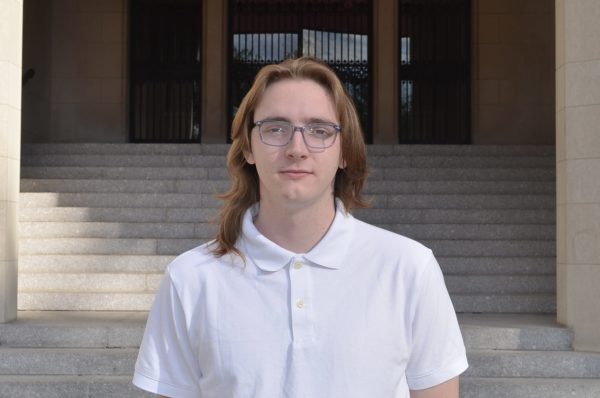The Fordham Humanities Consortium put on their second Humanities Fest, a series of events designed to give humanities students an opportunity to present their work to their fellow students on April 10.
Nathan Lincoln-DeCusatis, an associate professor of music and faculty director of humanities initiatives, said the goal was to “spotlight the humanities at Fordham through our student humanities scholars and mix in visual and performing arts.” Lincoln-DeCusatis said the Fordham Humanities Consortium hopes to host three Humanities Fests per semester going forward. Each event will feature three student speakers: one humanities scholar, one visual arts student and one performing arts student.
In his opening remarks, Lincoln-DeCusatis emphasized the importance of the humanities and arts in the Fordham University community. Afterwards, he said that he enjoyed the opportunity to host the event in Rodrigue’s Coffee House, as the venue encouraged a fun, informal discussion, unlike a typical research presentation or academic conference.
First up to present her work was Mia Guzzo, FCRH ’25, an English major with minors in marketing and women, gender and sexuality studies. She presented on her honors thesis within the English department, titled “Vampirism’s Revamp: The Reawakening of Vampire Media Through Memory and Race in ‘Interview With The Vampire’ (2022).” Guzzo’s research involved tracing the use of vampirism as a literary device from its origins in 19th-century gothic fiction to the 2022 television show “Interview With The Vampire.” Guzzo explained how her research problematized the relationship between vampirism and race and the competing forces of memory and history within vampire fiction.
Guzzo’s presentation demonstrated how vampirism was once a tool for social critique and a mode for expressing the experiences of marginalized people. However, new developments in the genre caused it to lose its socially critical edge. Guzzo criticized the new “vampire boyfriend” subgenre from the 2000s and 2010s, epitomized in media like “Twilight,” for its white-washed and straight-washed version of vampirism. In the conclusion of her presentation, Guzzo showed how “Interview With The Vampire (2022)” challenges a Eurocentric view of vampirism by centering the experiences of a Black gay man, letting the narrative be dictated by his choices, and refusing to sanitize his character for reasons of likability.
Following Guzzo, Lucy Duckett, FCRH ’25, a visual arts major, presented a photography project titled “En Gallop: A Midwestern Photographic Journey.”
For her project, Duckett travelled to several locations in the rural Midwest. In Hesperia, Michigan, she learned to camp in the rural countryside and got to know the local residents. When she got to Hesperia, she didn’t take pictures for the first three to four days.
“You have to get to know the people you’re going to photograph before you just click away,” she said. The Fordham College Rose Hill research grant she received allowed her to buy film and covered her travel expenses.
Duckett also visited Viroqua, Wisconsin. There, they met Rufus, who became a close friend. In Viroqua, Duckett stayed with a local lesbian couple and made strong enough connections that she went back over spring break. Throughout her presentation, Duckett emphasized how her project allowed her to authentically depict the stories of rural Midwesterners, especially queer and transgender rural Midwesterners. Out of the thousands of photographs she took, her faculty mentor, Professor Stephan Apicella-Hitchcock, helped her narrow down the best ones for her exhibition.
Last, music major Emily Jaswel, FCRH ’25, presented “Hearing Colors: Synesthesia and Musical Improvisation.” To start her presentation, Jaswel defined synesthesia and what it adds to her experience of music. Jaswel described how she has sound-color synesthesia, where hearing sounds causes her to see colors. After walking the audience through several examples of associated sounds and colors, she displayed a series of images and improvised violin pieces based on them, demonstrating how her synesthesia informs her music.
“[My synesthesia is] not something I can control, but something I’ve learned to live with and embrace,” said Jaswel.
She pointed out how the experience of synesthesia is an example of the philosophical concept of qualia, which states that everyone has a different subjective experience of the world that no other can fully understand.
“We all have different ways of experiencing the world, and that is something that should be celebrated,” she said.







































































































































































































